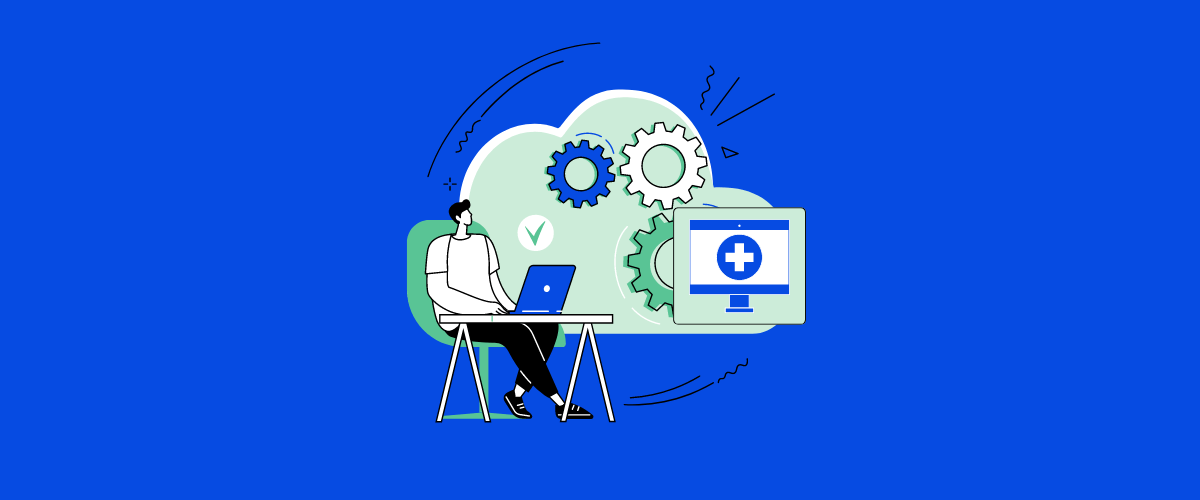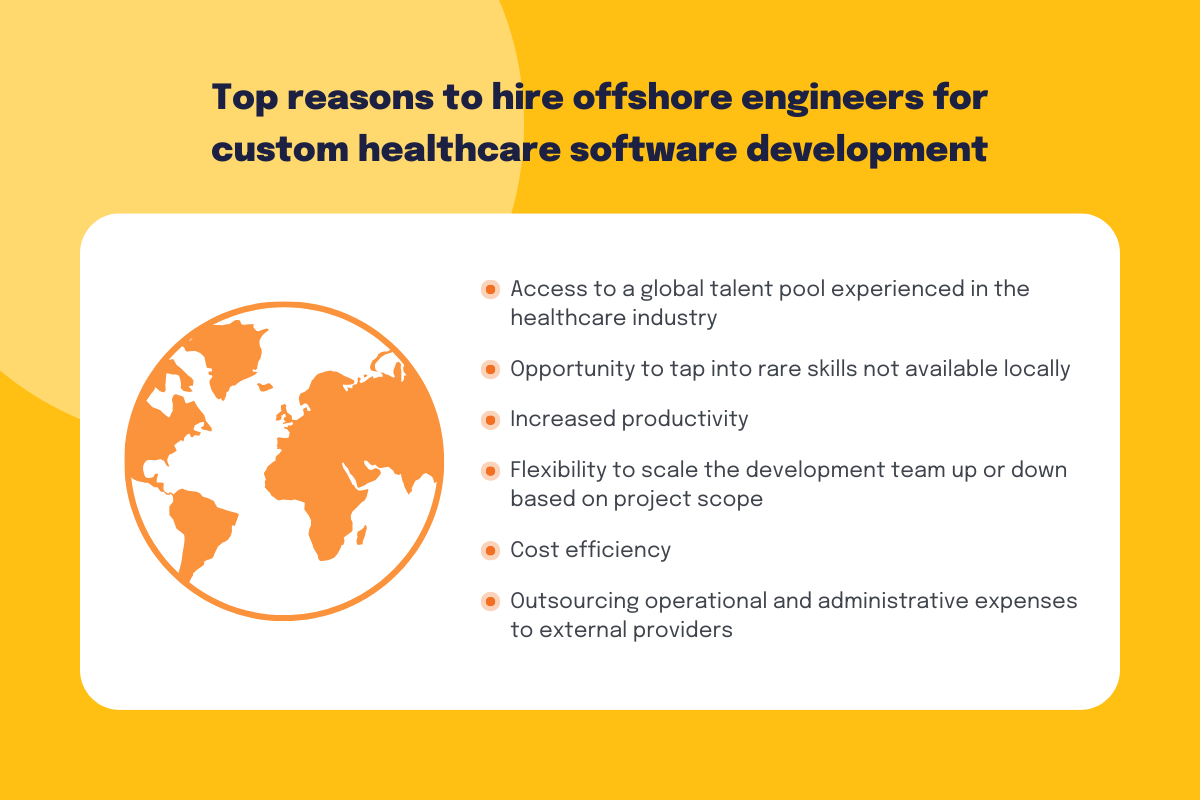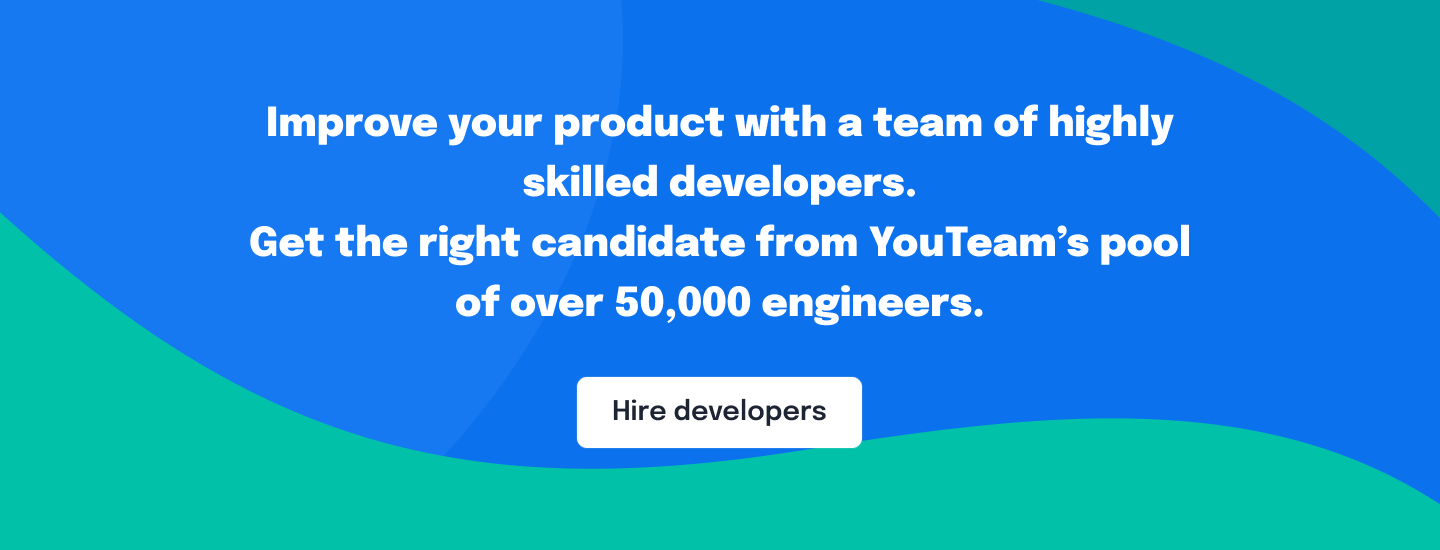The outbreak of COVID-19 highlighted the need and, perhaps, urgency for digitizing healthcare systems. A digitized healthcare system would help streamline the healthcare process and make it easier to track individual patient care while also adhering to privacy regulations. In addition, most companies would benefit from customized healthcare software to provide the best-individualized care. Therefore, hiring a competent healthcare software developer is vital. Our comprehensive guide will help you search for the best-suited healthcare software developer.
Table of Contents
An overview of the healthcare industry
The healthcare industry is one of the biggest industries in the global market. The value of the worldwide healthcare market stands at a booming $7.975 billion and is expected to grow to $9.816 billion by 2027. The healthcare market includes all companies that provide clinical services, health-related support, and the development of drugs and medical equipment.
The impact of COVID-19 on the healthcare industry
The effect of the COVID-19 pandemic has deeply penetrated every layer of society, and the healthcare industry is also riding the shockwave. When the pandemic had initially begun, it had started a three-phase reaction which was to respond, recover, and finally renew. The entire healthcare system has been deeply affected, keeping in mind the state of the pandemic and the various problems posed by the same. Supply chain failure, staff quarantine, and the general growth in safety protocols have furthered worry in the hospital industry.
In addition to these challenges, the pandemic has also impacted the medical billing processes across various specialties, including cardiology. For those working in cardiology practices, understanding the complexities and staying updated with the latest changes is crucial. A comprehensive guide to cardiology medical billing can be a valuable resource in navigating these challenges and ensuring smooth billing operations during these uncertain times.
The state of the healthcare software development
Information technology has revolutionized every aspect of our lives. So, it is natural that healthcare organizations are also in need of healthcare software solutions for maintaining electronic health records, medical history, patient personal information, and a plethora of other medical data. With the development of the COVID-19 pandemic, the healthcare market was feeling the heat like never before.
In the post-pandemic time, the experience of such a huge event makes us look at the development of medical software or mobile applications that will enable healthcare organizations to provide better facilities and look at it from a different angle. The entire healthcare software development sector has now begun to spearhead a movement that will allow us to transform the rudimentary paper-based system into a digitized form that will surely provide portability as well as betterment in patient safety and make the industry more effective with electronic medical records. The global healthcare analytics market size is projected to grow from $23.51 billion in 2020 to $96.90 billion by 2030 at a compound annual growth rate (CAGR) of 15.3% during this forecast period.
Healthcare software trends for 2024 and beyond
Like various sectors that have been affected by advances in technology, the entire lot of healthcare providers have also felt the effects of utilizing software solutions. There have been certain trends that have popped up in the software development process. Some of these trends include the following:
Telemetry and remote monitoring
The approval from the FDA to begin using remote monitoring devices following the outbreak of the pandemic has paved the path for the use of this technology. Not only does this technology assist those in need of medical attention, but it also adds an element of better quality and timeliness, enabling the streamlining of medical processes. The market share for the global healthcare telemetry market is expected to reach more than $400.60 billion by the year 2026 (CAGR of 12.5%).
Telemedicine
A survey by Merritt Hawkins of 15 metropolitan cities has concluded that a new patient takes about 29.3 days to schedule an appointment with a family doctor. This has pushed many hospitals to start a telehealthcare service to increase the efficiency of reaching out to people. This way, telemedicine is aimed at advancing clinical workflow and minimizing the need for patients to visit the hospital unless it is an emergency.
Machine learning and artificial intelligence in healthcare
The use of artificial intelligence in the treatment of patients has now been adopted by many healthcare services, thereby enhancing the digital health scenario. The goal is to reduce the cost of medical services and limit human error in healthcare. The use of machine learning and artificial intelligence has exploded in the market and is thus expected to grow to an estimated $194.4 billion by 2030. The application of artificial intelligence can be expected in such tasks and processes as robot-assisted surgery, fraud detection, preliminary diagnosis, and dosage error reduction. A healthcare data platform enabling developers to access granular level health data on-demand are an important part of successful machine learning projects.
IoT and IoMT
Along with the development of telemedicine and telehealth came the discovery of the Internet of Many Things (IoMT) in the medical field. This technology combines the use of various wearables, including EKG and ECG monitors, as well as some measurement procedures such as checking glucose levels, blood pressure, and skin temperature. The sector has been further divided into a number of segments, such as medication management, connected imaging, remote patient monitoring, and fall detection.
Organ care system technology & bioprinting
Organ care technology is an exciting new field that is currently being developed to help improve the quality of life for organ transplant patients. One of the key aspects of this technology is bioprinting — the process of creating 3D tissue models from living cells. This technology has the potential to create organs that are identical to the patient’s own, which would greatly reduce the risk of rejection during transplantation. Additionally, bioprinting could also be used to create organs for patients who are unable to receive traditional transplants due to insufficient donor availability. The bioprinting field has shown positive growth in 2021, reaching $1.18 billion, and is projected to grow to $5.87 billion by 2030 at a CAGR of 19.4%.
Augmented & virtual reality in healthcare
Augmented and virtual reality broadens its use in healthcare institutions to improve patient care. These technologies have the potential to revolutionize the way doctors provide care by creating immersive, realistic environments that can be used for training, diagnosis, and treatment.
In surgery, for example, augmented reality can be used to help surgeons identify difficult-to-see tumors or guide needles into specific areas. Virtual reality is also being explored as a tool for treating phobias by exposing patients to their fears in a controlled environment.
The advantages of custom healthcare software development
Custom healthcare software development can provide many benefits for healthcare organizations. By tailoring software to the specific needs of a healthcare organization, custom software can help to improve patient care, increase efficiency, and reduce costs. The following are some of the other benefits associated with developing healthcare software.
What is custom software development?
Custom software development is the process of designing, creating, deploying, and maintaining software for a specific set of users, functions, or organizations. In contrast to commercial off-the-shelf software (COTS), custom software development aims at a narrowly defined set of requirements. Conversely, COTS targets a broad set of requirements, allowing it to be packaged and commercially marketed and distributed.
Off-the-shelf vs. custom healthcare software development
A continuing debate exists as to which is better, off-the-shelf or custom healthcare software development. The thing about custom software is that it is designed for a particular customer to meet their specific set of requirements. For example, in the hospital sector, the software might be developed keeping in mind the maintenance program and patient security.
This is different from off-the-shelf software development, which is more generalized and not personalized or tailored. In-house developers generally create custom software, and thus, it is usually costlier than off-the-shelf products. Therefore, there lies quite a gap between these revolutionary technologies based on functionalities, usability, and performance.
While custom software healthcare development is costlier than off-the-shelf products, you can get personalization depending on your area of implementation. If you believe that your hospital software requires much customization, it is always better to choose a custom software development route rather than an off-the-shelf route.
Browse 500+ Developers Available for Hire
The pros and cons of custom software development
The benefits of using custom software include:
- The technology allows you a vast range of customization in every direction you need, whether looking for an effective patient portal or other mobile health records. Since the development of healthcare software solutions is relatively intricate, this might be a better option for hospitals.
- These software products are incredibly efficient as they are built for a particular purpose. This adds a layer of smooth functioning to this software, making it increasingly user-friendly.
- Custom software healthcare development can be created to fit the existing environment. You will not have to think about the legal and technical aspects as it can be easily customized.
- Custom software can grow and develop as the industry grows.
- The best part of being disconnected from commercial software is that you can enjoy independence from other price hacks and licensing hassles.
The disadvantages of using custom software include:
- It is costlier and requires a lump sum investment.
- Prior to the development of the custom software, much time was lost properly defining business needs and finding out how the healthcare application to be developed would address those needs.
- Choosing the wrong software development company may be a complete waste of time and effort.
Medical software development process
The process of medical software development is similar to the design and development of any other software product. It is a multi-step procedure that goes from concept and research to product building and maintenance. The stages of development typically include:
- Writing project requirements.
- Researching basic information about the product idea.
- Building a healthcare software prototype.
- Design and development.
- Testing the healthcare software.
- Deployment and maintenance.
Why is it better to outsource custom healthcare software development?
According to Deloitte’s 2022 Global Outsourcing Survey, more than 76% of companies preferred software development outsourcing rather than in-house development. The following include some of the reasons:
- Cost efficiency. About 46% of startups are likely to fail because they run out of money. However, when you hire offshore developers, this is far less likely. You will not need to spend money on overhead costs, including payroll, office space, insurance benefits, and vacations. On the other hand, you can use these funds to create more critical domains. Moreover, the rates commanded by offshore developers for website creation or mobile app development are much lower than those in Western countries, making it more affordable.
- Access to global professionals and the latest talent. It allows you to connect with other healthcare professionals worldwide. If you have few specialists in particular areas of the healthcare industry, offshore professionals can provide you with diversifying skills and much talent.
- Greater focus on core business processes. When you do not have to spend time on other activities to freshen up or polish your team’s talent, you can spend time and energy on activities that will truly benefit your organization. When you hire offshore developers already skilled and talented in medical software development, you will not have to provide them with rounds of briefings and training, as they are ahead of the game. You can spend this time, instead, developing essential hospital resources.
- Increased productivity and saving time. Offshore professionals can also help you increase productivity in healthcare app development or website building, saving time. These developers already have the necessary skills, and you will not need to spend additional time on training and skill development. You can spend meaningful time on HR activities and practices.
- Flexibility. When it comes to an in-house team, it can be complicated to manage and scale the entire team or to create alterations in the technology that will improve the scope of a project. In the case of software development services, flexibility is greatly needed. Outsourced developers are much more flexible and numerous, so you can choose to collaborate with those that best fit your criteria.
Cost of hiring a healthcare software developer in different countries
The average cost of a skilled programmer with years of experience is pricey, especially for the healthcare industry. The average annual salary of a software developer in the United States is $103,620. In Western European countries, the average hourly rate of software engineers, according to Glassdoor, is around $56 in Germany, $82 in France, and $71 in the UK.
These options are quite costly and require considerable investment. If you want to check out some affordable options, check the rate for healthcare engineers from various parts of the world, and find out the most viable destinations for outsourcing software development. For example, these include countries like China, Taiwan, the Philippines, Poland, and Ukraine. The rates are almost less than half the price for these software engineers in comparison to their Western counterparts. For example, the average salary of a healthcare software developer in Ukraine is about $42.
The average hourly rates for software development in other regions are as follows:
|
Eastern Europe |
|
| Ukraine | $42 |
| Bulgaria | $35 |
| Croatia | $27 |
| Czech Republic | $49 |
| Hungary | $41 |
| Poland | $43 |
Source: Indeed, Glassdoor, SalaryExpert
|
Latin America |
|
| Bolivia | $36 |
| Brazil | $45 |
| Costa Rica | $48 |
| Chile | $53 |
| Mexico | $58 |
| Peru | $51 |
Source: Indeed, Glassdoor, SalaryExpert
|
Asia |
|
| Bangladesh | $27 |
| China | $36 |
| India | $31 |
| Malaysia | $33 |
| Nepal | $25 |
| Philippines | $26 |
Source: Indeed, Glassdoor, SalaryExpert
|
Africa |
|
| Egypt | $23 |
| Kenya | $25 |
| Morocco | $32 |
| Nigeria | $36 |
| South Africa | $32 |
Source: Indeed, Glassdoor, SalaryExpert
Tips for sourcing and hiring a team of remote healthcare software developers
- Look for a proven track record. When hiring outsourced service providers, look for their ranking on websites like Clutch. You can also look for the profile on LinkedIn and find the clients they have interacted with. You can again go a step further and contact old clients and get their actual reviews.
- Make sure of their workflow. You need to understand how the team communicates with clients and how developers are allocated to a particular project. Take the flexibility into account, and only hire a team whose workflow matches your management style.
- Check their accessibility to recent codes. There are some instances where a developer may deny releasing a principle due to some personal conflict. Even before cooperation starts on the project, make sure you have access to the code at all times.
- Reject if the quote is too low. It is crucial that you prioritize the ultimate results in patient care rather than opt for cheap quotes. Sometimes quality is determined by the amount of money you spend. Remember, you’ll end up spending more in the end if the code needs to be rewritten.
- Make sure the team is cooperative. Pay attention to complying with your requirements. However, if a developer agrees with all your demands, it may merely mean that they need to go through your requirements thoroughly. You must consider the developer’s specialized skills and use them for your project.
- Get a proper project management tool. With the help of a proper collaboration tool, it will be much easier to maintain a relationship with the offshore developer.
- Insist on updates. You must always ask the developers to provide you with periodic demos and updates.
- Be Involved with the team. It is vital for you to be proactive with the offshore team, which will help you to keep track of the developments on your project.
Why hire dedicated healthcare software developers with YouTeam?
There is no shortage of offshore developers. When choosing one for healthcare solutions, you need to make the best choice. Here are some reasons why you should depend on YouTeam:
- A versatile group of software developers to choose from YouTeam provides a wide variety of developers that you will not be able to find when coordinating with a regular development agency.
- Get the best dev shops: YouTeam only chooses dev shops that have passed through a multi-stage screening process. Their worth and reliability are checked before handing them to clients. Each and every team is handpicked after the rigorous screening to yield the best results. Tests are conducted while picking up engineers, and their codes are reviewed to maintain high quality. Through this vetting process, you will be able to get the best custom healthcare management systems.
- Scalable Teams: The one thing about startup projects is the constantly changing scopes, especially at the MVP stage. At YouTeam, this is completely taken care of, and our clients are given the opportunity to scale the team according to their requirements and the number of developers needed.
Wrap up
In light of the COVID-19 virus outbreak, the healthcare industry needs to digitize the healthcare system and keep healthcare data intact. In this regard, custom software development is likely to be handy compared to off-the-shelf products because of their advantages. Offshore developers can add much to the table with respect to talent and skill and are also more affordable.








